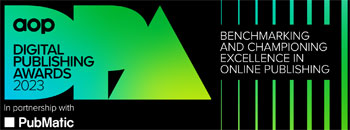
Q: What do you see as the main opportunities facing publishers over the next twelve months?
Gideon: Trusted journalism and great story-telling will never go out of fashion — it’s just that the tools, platforms and means of distribution are changing. Audio, video, data, live events, commerce and automation are all exciting areas for publishers. Trust is a key advantage at a time when social media and the broader online eco-system are under fresh scrutiny from advertisers, investors and regulators. Professional publishers have a real opportunity — if editorial and commercial teams adapt to their customers’ changing needs, focus on sustainable revenue and collaborate.
Hannah: The opportunity for publishers is to fully harness the power of their content and audiences to give advertisers data rich addressable solutions. The post-cookie world may leave some players in the supply chain struggling but this will strengthen and provide a host of opportunities for premium publishers to further grow relationships with readers and advertisers alike. We are incredibly fortunate to have a direct relationship with our users and therefore access to valuable first-party consent which is key for targeting, performance and monetisation.
Publishers have been on a digital transformation for years now and we have become truly data-driven businesses, capable of navigating a clear path through the new era of connections.
Q: What are the main threats facing publishers?
Gideon: Inflation, the cost of living and the recent slowdown in digital advertising are all challenges but they can be managed if publishers are prudent and look for new sources of growth. Similarly, the phasing out of third-party cookies and the rise of artificial intelligence software such as ChatGPT are threats but they can be turned into opportunities if companies plan ahead.
Hannah: With advertising and subscription such an important and growing source of revenue, ad blocking on desktop and mobile is an area of concern that is continuing to threaten both publishers and content creators. There are also new and sophisticated ways of sneaking past content pay walls that are vital to fund quality journalism. We need to make sure that the value exchange for users is made more clear and transparent so they understand that journalism cannot be produced without some method of revenue generation.
Q: What are publishers’ main strengths?
Gideon: The best publishers believe in the power of journalism. They are magnets for talent who are brilliant at creating remarkable content that will engage audiences. They are entrepreneurial businesses that are always looking for new ways to develop their brands and increase revenues. Importantly, digital subscriptions have become a major strength because they generate robust, recurring revenues. Publishing brands also have great convening power — when we stage events, our audiences want to come.
Hannah: One of our greatest strengths is our agility and ability to grow and diversify, to capitalise on new and emerging ways to engage audiences.
The last few years have seen the increasing popularity of original video content amongst digital audiences, fuelled by the growth of social video platforms such as TikTok and YouTube.
Aware of the importance of evolving to keep our offering fresh and engaging, digital publishers have been able to pivot in response to this and invest in video teams, growing our own video output to ensure we continue creating content that engages our audiences on whatever platform they choose to consume content.
Q: And... where are their weaknesses?
Gideon: Producing high-quality journalism and continuing to innovate are potentially costly, but publishers should be wary about cutting investment — even in tough economic times. Responsible companies face many shared challenges from competing with the tech giants to dealing with complexity in the digital advertising supply chain. Collaboration can help the industry to find solutions.
Hannah: Publishers just simply do not have the resources that the big digital players have, especially so in the cost-of-living crisis, so we have to be more targeted, more strategic and invest in tenacious people who will try to be everywhere all at once. Over and above this, we must work together more to shout about our incredibly exciting developments that hopefully will drive greater share into our brands and not just the latest fad.
Q: Where do you think publishers should be focusing their resources?
Gideon: Responsible growth should be the mantra. In terms of driving growth, that means focusing on areas such as digital subscription strategy, deeper brand partnerships, first-party data, premium events and innovative new formats. In terms of responsibilities, investing in journalism, improving inclusion and ensuring sustainability in all its forms are key – and must not be allowed to slip down the agenda because of financial constraint.
Hannah: Product innovation and talent. In the face of tough times, we must continue to nurture our diverse and skilled work force. The focus should be on bringing in new entry level, supporting apprenticeships and retaining and supporting our team members.
Publishers need to adapt our offering to ensure that current and future talent feel valued and that their workplace is a safe and welcoming space for all. With people who are healthy, both physically and mentally with strong support networks in place, we can achieve anything!
Q: What excites you most about the next twelve months?
Gideon: As editor-in-chief of a brand which covers the advertising and media world, it’s exciting to observe so much change — even if some of this disruption and uncertainty is painful. There are lots of dramatic stories to tell.
Hannah: We now can bring the human and fun element back to media. I am so excited for more face-to-face meetings, events, networking, entertaining and building stronger relationships than ever with our advertisers and clients. Over the last few years, we have learnt to adapt and become more resilient and I am certain that we will overcome whatever challenges the future holds.
Q: Why are awards events, such as the AOP Digital Publishing Awards, so important?
Gideon: Awards matter because they are public recognition of your work and they are judged by your peers. If you get nominated, it is good for your brand, your company and your career. Everyone wants to win but it is also about taking part. When you write an award entry, you learn to tell your story and it is motivating to think about how to produce award-worthy work — now and in the future.
Hannah: Whether you win at an awards or not, being nominated in the AOP Digital Publishing Awards is a great accolade for your business and teams. In an industry that is constantly evolving like ours, it is really important to take the time to recognise and celebrate excellence in individuals and organisations who have pushed the boundaries of digital publishing. I hope to see you all there to celebrate our industry’s success.

About us
The AOP Digital Publishing Awards celebrate the talents and skills of the individuals and teams working to create, deliver, and monetise quality online content. Winning an AOP Award demonstrates to your team, to your readers, and to your clients that your online publishing brand is the leader in its field – that you are investing in the quality journalism, innovative thinking, and digital tech that is essential to providing value and driving growth.
Website: www.ukaop.org/digital-publishing-awards
Email: awards@ukaop.org
Awards timetable
Entry deadline: 23 March
Shortlist announcement: 26 April
Awards ceremony: 14 June










